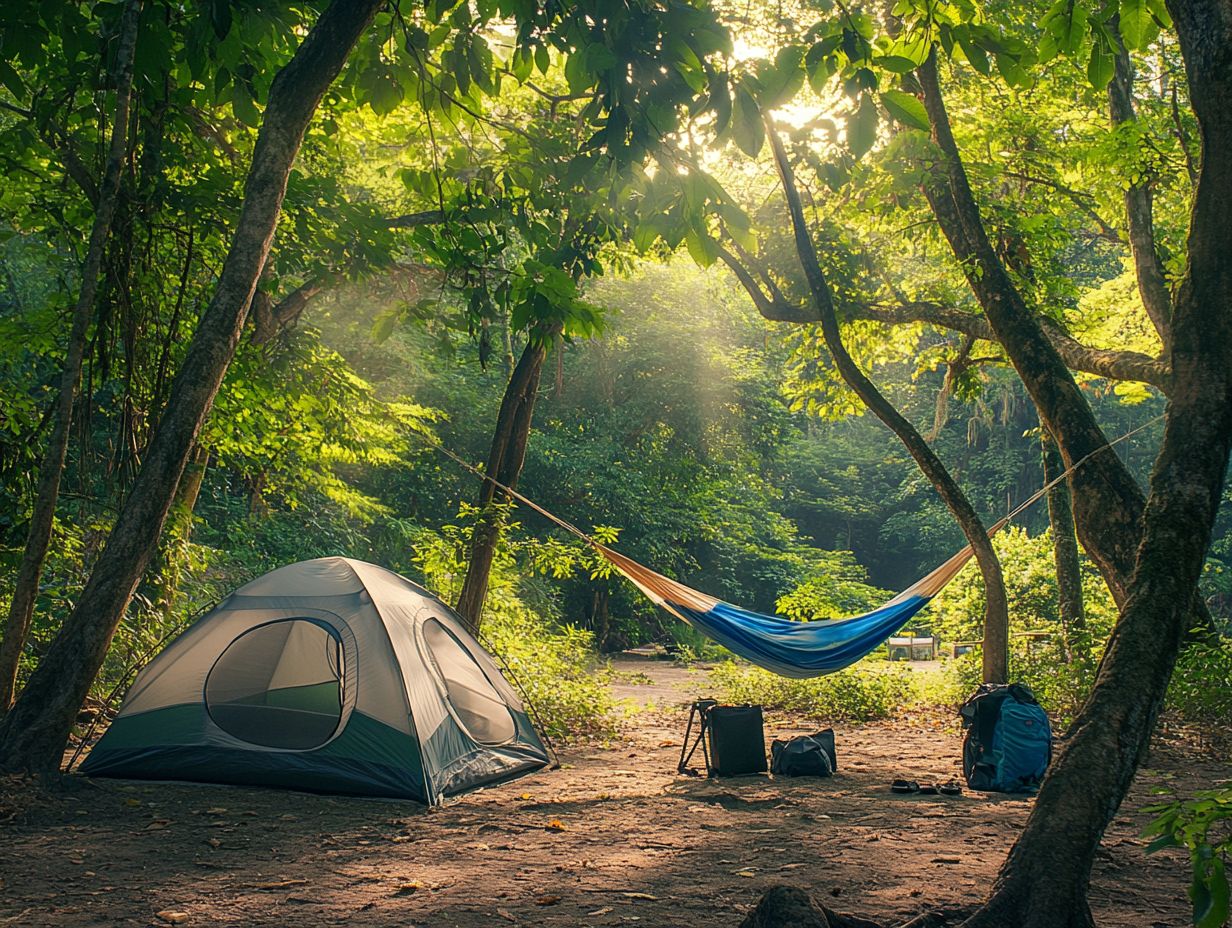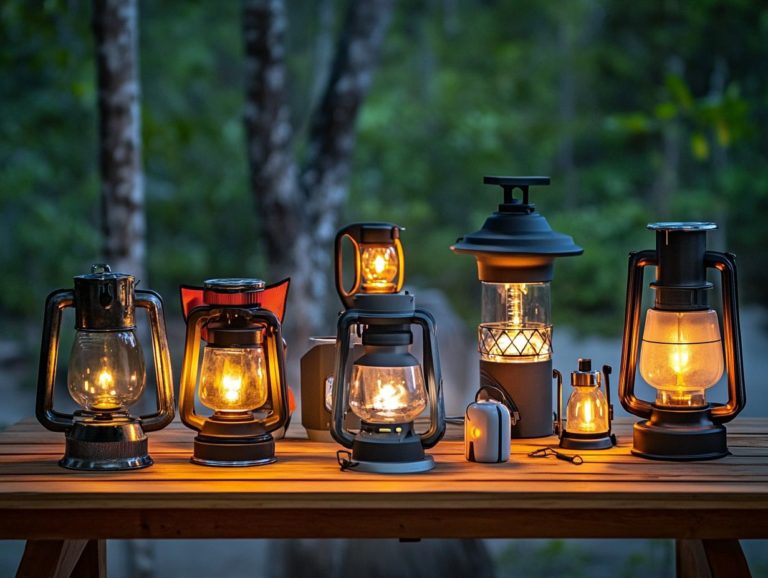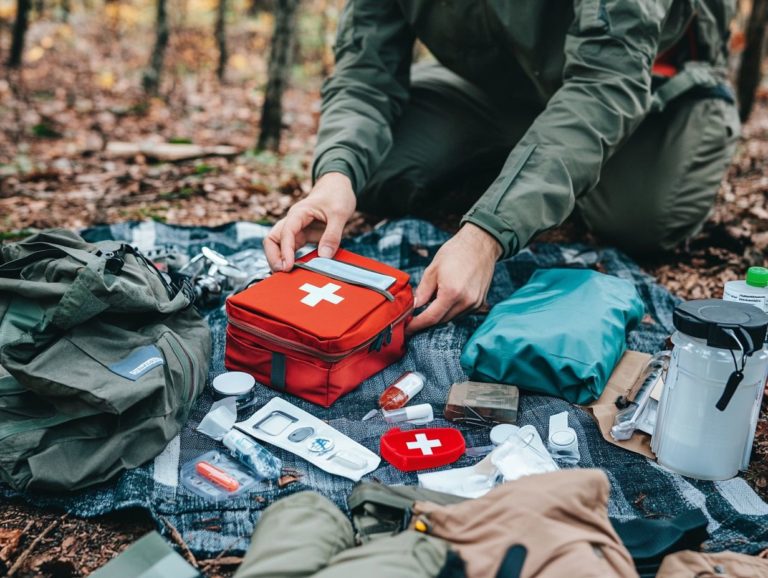How to Choose Between a Tent and a Hammock?
When you re planning your next outdoor adventure, an important choice lies ahead: will you camp in a tent or unwind in a hammock? Each option has its own appeal, and the right one can significantly influence your overall experience.
This article explores key considerations such as comfort, location, and weather while weighing the pros and cons of both tent camping and hammock camping. By the end, you ll be ready to make the best choice for your adventure!
Contents
Key Takeaways:
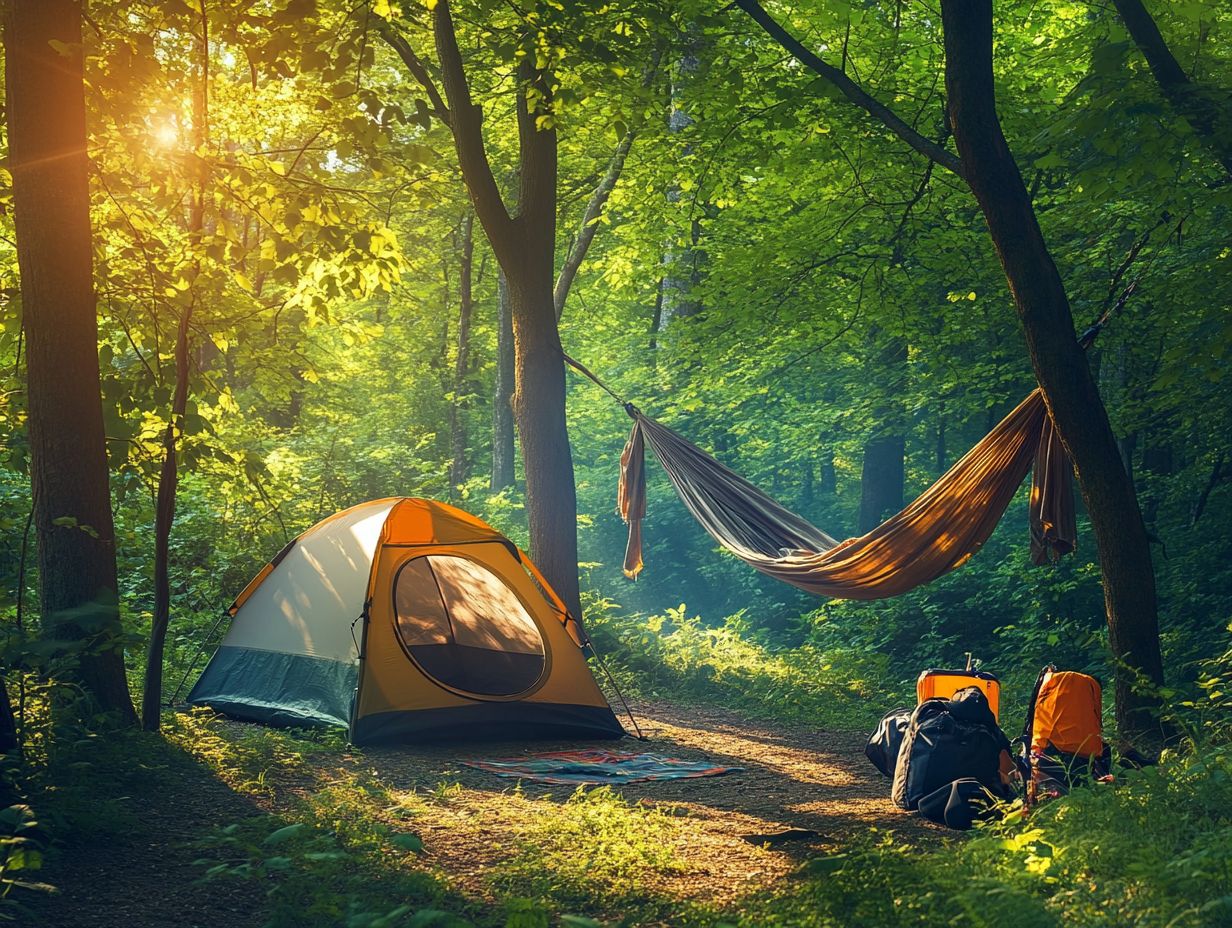
- Think about your comfort and convenience: tents give you more space, while hammocks are light and quick to set up!
- Consider your location and terrain: tents work better on rocky ground, while hammocks shine in areas with trees.
- Keep weather conditions in mind: tents offer more protection from rain and wind, but waterproof tarps can enhance hammock camping.
What are Tents and Hammocks?
Tents and hammocks offer two exciting camping options, each providing a distinctive experience for outdoor enthusiasts like you. With tent camping, you embrace a traditional ground-level setup, complete with camping gear such as sleeping bags and essential supplies. In contrast, hammock camping allows you to enjoy the comfort of sleeping among the trees.
Both methods come with their own features and limitations, shaping your camping experience based on your preferences and the surrounding terrain. Understanding the differences between hammock and tent camping will help you make informed decisions for your next outdoor adventure.
Factors to Consider When Choosing Between a Tent and a Hammock
When deciding between hammock camping and tent camping, several crucial factors will shape your outdoor experience. Consider aspects like comfort, the lay of the land, and ever-changing weather conditions each plays a significant role in how you connect with nature.
Whether you crave the simplicity of a lightweight hammock for a spontaneous getaway or prefer the stability of a tent, understanding these elements will ensure you sleep soundly and savor every moment of your outdoor adventures!
Comfort and Convenience
Comfort and convenience are key factors when choosing between hammock camping and tent camping. These elements ultimately shape your overall experience in the great outdoors.
As you weigh your options, you might find that sleeping in a hammock offers a delightful blend of relaxation and ease. The gentle sway can provide a truly elevated sleep experience. To enhance this comfort, essential hammock accessories like bug nets and insulating layers for warmth, known as under quilts, protect you from the elements, ensuring a restful night.
You ll likely discover that setting up a hammock is quicker and less cumbersome. Their lightweight design allows for easy transport in your backpack, adding a level of convenience that many campers appreciate.
Location and Terrain
The location and terrain of your camping site can greatly influence whether hammock camping or tent camping is the better choice.
In rugged areas, like mountainous or densely wooded landscapes, traditional tent setups may face challenges. You ll need to seek out level ground while navigating obstacles like rocks and roots. Hammock camping is better in these environments, allowing you to set up easily between sturdy trees, elevating you above rocky terrain and keeping you off damp ground.
On flat ground, tents provide more room and stability, making them a better option for families or groups. Regardless of your choice, remember to consider safety measures. Make sure you anchor your hammocks properly and secure your tents effectively for a worry-free night under the stars.
Weather Conditions
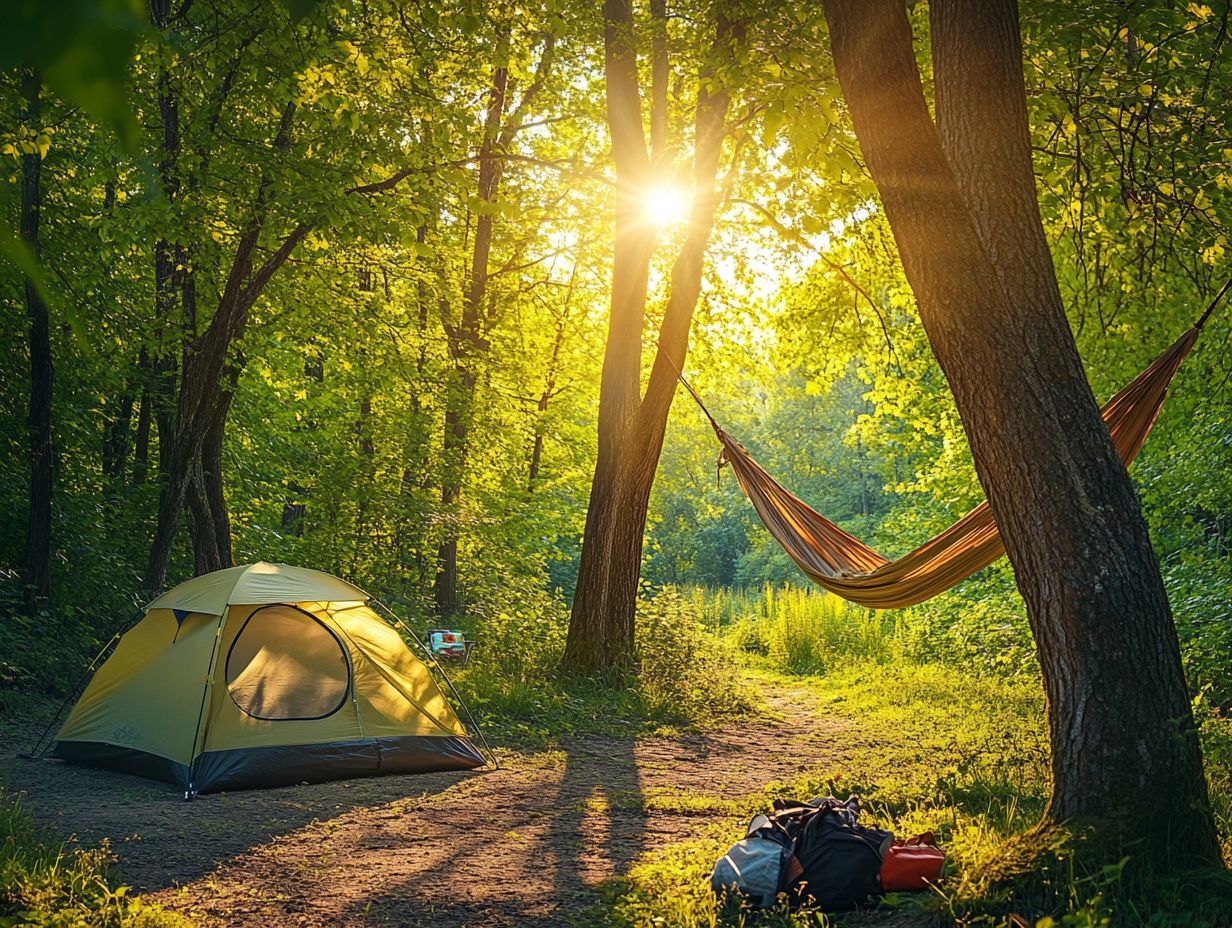
Weather conditions play an important role in your choice between hammock camping and tent camping. They influence both your comfort and security during the experience.
Unexpected rain showers, biting winds, or extreme temperatures can dramatically shape the equipment you ll need for a successful outing.
If you re leaning toward hammock camping, investing in waterproof tarps large sheets of material that keep you dry is essential. They shield you from rain and falling debris, ensuring that your cozy nook stays dry above the forest floor.
On the other hand, camping in a tent provides enhanced wind resistance and insulation, making it a more favorable choice when facing harsh weather patterns.
By understanding how each option addresses various conditions, you can ensure that your outdoor adventures remain enjoyable. This allows you to connect more deeply with nature during your camping experience.
Pros and Cons of Tent Camping
Tent camping has its unique advantages and drawbacks. These can significantly shape your overall experience in the great outdoors.
As an outdoor enthusiast, it s vital to consider these factors before setting off on your adventure.
Advantages and Disadvantages
Tent camping offers plenty of advantages, like spaciousness that accommodates multiple campers. However, be prepared for some downsides, such as the time it takes to set up.
It also presents challenges like the limited comfort of the ground beneath you.
Beyond the essentials, tent camping provides robust protection against unpredictable weather, creating a cozy refuge after a long day of hiking or exploring.
The interior storage space a tent offers helps you organize your supplies efficiently, keeping your campsite clutter-free and enhancing your experience.
However, it s essential to acknowledge the downsides, such as the tent’s weight and the various components that can add bulk to your load.
The complexity of setting up can be intimidating for less experienced campers, especially in challenging conditions. This may detract from your enjoyment of the great outdoors.
Pros and Cons of Hammock Camping
Hammock camping presents a distinctive array of advantages and disadvantages. Understanding these elements is crucial before deciding on your camping approach.
Advantages and Disadvantages
The advantages of hammock camping are appealing: you enjoy a flexible campsite, enhanced comfort, and excellent bug protection.
However, be aware of the downsides, such as limited storage and potential setup challenges.
This outdoor experience allows you to effortlessly find ideal spots between trees. This grants access to stunning views and a deeper connection to nature.
Hammock camping is also a lightweight and portable option, perfect for backpackers and anyone looking to streamline their equipment.
On the flip side, relying on specific conditions for hanging can introduce hurdles. If trees are sparse or ground moisture is high, setting up can become tricky.
This can lead to frustration if you’re not prepared to adjust. Carefully weighing these factors is vital for ensuring a rewarding adventure in the great outdoors.
Tips for Choosing the Right Tent or Hammock
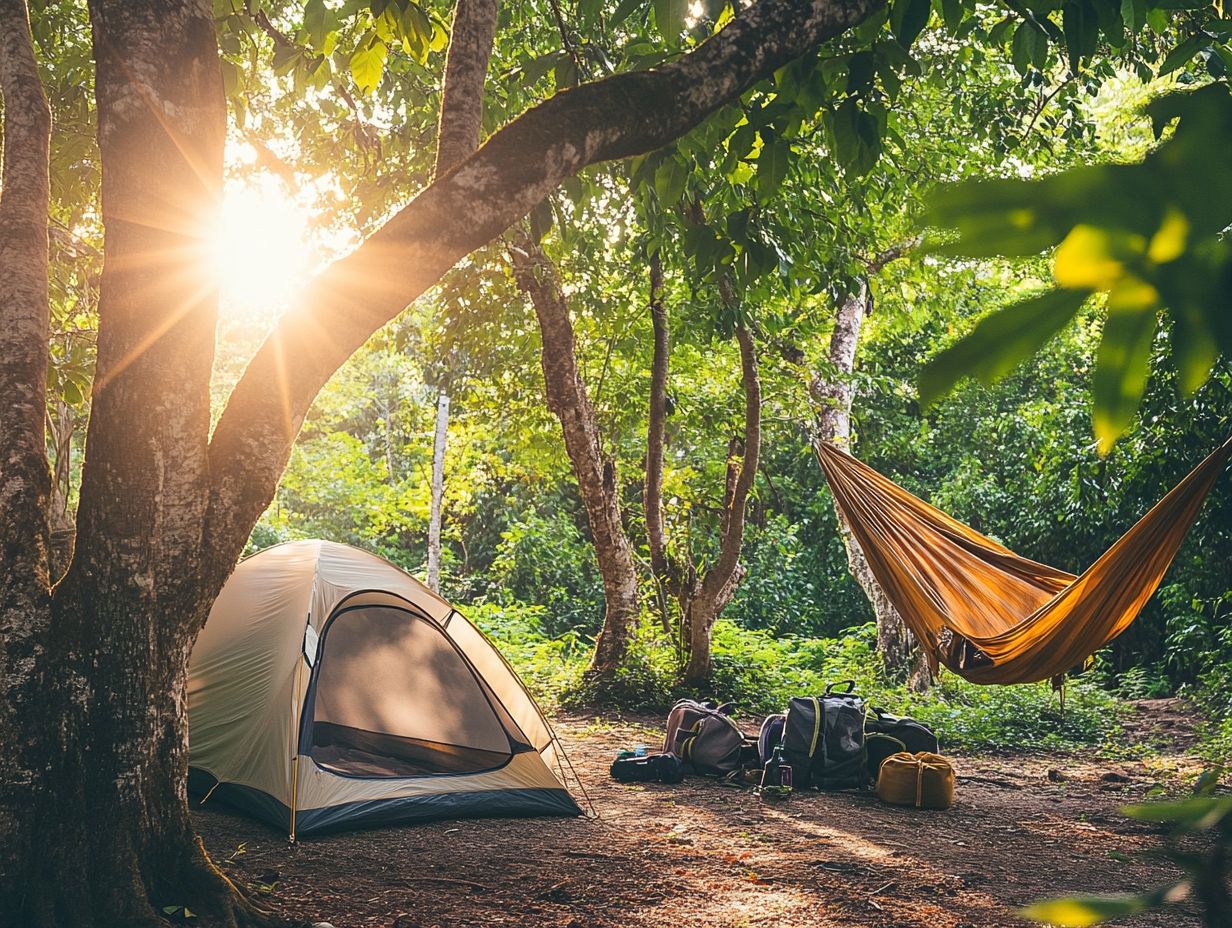
Selecting the perfect tent or hammock is an important decision that can profoundly impact your camping experience.
To navigate this important choice, consider several key tips that will guide you in making the best selection.
- Understand your camping environment and weather.
- Evaluate how much space you need.
- Consider your comfort preferences.
- Think about the weight and portability of your gear.
- Don t miss out on the chance to choose the right equipment!
Key Features to Look For
When selecting a tent or hammock, it s crucial to understand the key features that will ensure your sleep is comfortable and your camping experience is seamless. Consider elements like warm top quilts and under quilts, which help keep you warm underneath your hammock.
Also, think about waterproof materials, weight, and ease of setup. Each of these plays a significant role in your decision. A waterproof tent keeps you dry during unexpected rain, while lightweight options are ideal if you re a backpacker aiming to keep your load to a minimum.
A hammock that sets up effortlessly can save you valuable time and energy at the campsite. Don t miss out on essential accessories! Straps, under quilts, and bug nets can greatly enhance both the functionality and comfort of your setup, allowing you to savor your time in nature without unnecessary distractions.
Factors to Consider and Personal Preferences
When evaluating your camping options, it s essential to weigh various factors alongside your personal preferences, including camping safety and comfort, to determine whether a tent or hammock best aligns with your needs.
The style of camping you favor plays a pivotal role in this decision-making process. If you identify as an adventurous backpacker who cherishes mobility and lightweight gear, a hammock might be more appealing due to its effortless portability. To ensure you select the best option for your needs, check out our guide on how to choose the right hammock for camping.
Conversely, if you’re part of a larger group or family, tents often offer the space and comfort you need for relaxation and storage. Your desired level of comfort will also influence this choice. While some may revel in the thrill of sleeping under the stars in a hammock, others may prioritize the protection and insulation a tent provides against unpredictable weather.
Ultimately, your unique blend of preferences will guide you in crafting the perfect camping setup.
Frequently Asked Questions
-
How to Choose Between a Tent and a Hammock?
Choosing between a tent and a hammock can be a tough decision, especially for first-time campers. Here are some factors to consider to help you make the right choice.
-
What type of camping trip will you go on?
If you’re planning a backcountry or backpacking trip, a hammock may be the better option due to its portability. However, if you’re planning a car camping trip, a tent may provide more comfort and space.
-
What is the weather forecast?
Consider the weather conditions for your trip. If you’re expecting rain or strong winds, a tent will provide better protection and stability compared to a hammock.
-
How many people are you camping with?
If you’re camping with a group, a tent may be a better choice for socializing and sleeping together. Hammocks are more suitable for solo or couples camping trips.
-
Are there suitable trees or poles for a hammock?
If you’re planning on using a hammock, ensure there are suitable trees or poles available at your campsite. Otherwise, a tent may be a more practical option.
-
Do you have any physical limitations?
If you have any physical limitations or back problems, a hammock may not be the best option for you. A tent provides a flat and stable surface for sleeping, while a hammock may put strain on your back and joints.

